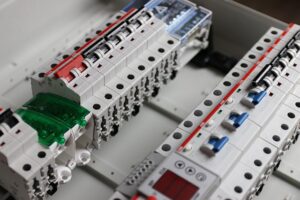The electrical grounding system is an essential safety feature in any building’s electrical system. It helps protect electrical devices and appliances from damage, prevents electrical shocks and fires, and ensures that the electrical system operates safely and efficiently.
If an electrical panel is not grounded, it can cause damage to appliances and devices, electric shocks, and fires due to electrical surges. Grounding is essential for safety in electrical systems.
In this article, we will discuss what happens if an electrical panel is not grounded and why it is crucial to have a properly grounded electrical system.
Table of Contents
What is Electrical Grounding?
Electrical grounding is the process of creating a low-resistance path for electrical current to flow to the earth.
It is done to ensure that excess electrical current can safely flow away from electrical devices and appliances and into the ground, rather than building up and causing damage or creating safety hazards.
The electrical grounding system typically consists of a grounding conductor, which is a wire or rod that is connected to the electrical panel and runs down into the ground.
This grounding conductor provides a low-resistance path for excess current to flow to the earth, ensuring that the electrical system is safe and efficient.
Why is Electrical Grounding Important?
Electrical grounding is essential for several reasons. First, it helps protect electrical devices and appliances from damage by providing a path for excess current to flow away from them and into the ground.
Without grounding, electrical devices and appliances can become dangerous and potentially cause damage or injury.
Second, electrical grounding helps prevent electrical shocks by providing a low-resistance path for excess current to flow away from the person touching an electrical device or appliance.
If the electrical system is not properly grounded, a person touching an electrical device or appliance can become the path of least resistance for the excess current to flow to the ground, potentially causing a severe electrical shock.
Finally, electrical grounding helps prevent fires by ensuring that excess electrical current does not build up and create heat, which can cause electrical devices or appliances to overheat and catch fire.
By providing a low-resistance path for excess current to flow to the earth, electrical grounding helps keep the electrical system safe and prevents fires from occurring.
What Happens If an Electrical Panel Is Not Grounded?
If an electrical panel is not grounded, several potential safety hazards can occur. First, electrical devices and appliances may become dangerous and potentially cause damage or injury.
Without a low-resistance path for excess current to flow away from them, electrical devices and appliances can build up excess current, potentially causing damage or injury to the device, the wiring, or the person using the device.
Second, the risk of electrical shocks increases significantly if an electrical panel is not grounded.
Without a low-resistance path for excess current to flow away from the person touching an electrical device or appliance, the person becomes the path of least resistance for the excess current to flow to the ground, potentially causing a severe electrical shock.
Finally, the risk of fires increases significantly if an electrical panel is not grounded. Without a low-resistance path for excess current to flow to the earth, excess current can build up and create heat, potentially causing electrical devices or appliances to overheat and catch fire.
How to Check If an Electrical Panel Is Grounded
If you are unsure whether your electrical panel is grounded, several signs can indicate that it may not be. These include:
- Flickering lights
- Electrical shocks when touching appliances or electrical devices
- Burning smells or smoke coming from electrical outlets or devices
- Electrical devices or appliances not working correctly or shutting off unexpectedly
If you notice any of these signs, it is essential to contact a licensed electrician to inspect your electrical system and determine whether it is properly grounded.
To check whether your electrical panel is grounded, you can also look for a grounding wire or rod connected to the panel.
The grounding wire or rod is typically connected to a grounding electrode, which is buried in the ground near the building. This grounding electrode provides a low-resistance path for excess current to flow to the earth.
You can also use a multimeter to test whether your electrical panel is grounded. A multimeter is a device that measures electrical current, voltage, and resistance.
To test whether your electrical panel is grounded, you can set the multimeter to measure resistance and touch one of the probes to the grounding wire or rod connected to the panel and the other probe to a metal part of the panel. If the multimeter shows a low resistance reading, the panel is properly grounded.
How to Ground an Electrical Panel
If you discover that your electrical panel is not properly grounded, it is essential to have it grounded as soon as possible. To ground an electrical panel, you will need to follow several steps, including:
- Shut off the power to the electrical panel. Before you begin grounding the panel, you must shut off the power to the panel to avoid any electrical shocks.
- Install a grounding rod or electrode. To ground the panel, you will need to install a grounding rod or electrode in the ground near the building. The grounding rod should be at least 8 feet long and made of copper or galvanized steel.
- Connect the grounding rod to the electrical panel. Once you have installed the grounding rod, you will need to connect it to the electrical panel using a grounding wire. The grounding wire should be made of copper and at least as large as the largest wire in the electrical panel.
- Test the grounding system. Once you have connected the grounding wire to the panel, you should test the grounding system using a multimeter to ensure that it is working correctly.
- Have the system inspected. After you have grounded the electrical panel, it is essential to have the system inspected by a licensed electrician to ensure that it is safe and up to code.
Conclusion
In conclusion, electrical grounding is an essential safety feature in any building’s electrical system. It helps protect electrical devices and appliances from damage, prevents electrical shocks and fires, and ensures that the electrical system operates safely and efficiently.
If an electrical panel is not properly grounded, several potential safety hazards can occur, including damage to electrical devices and appliances, electrical shocks, and fires.
To ensure that your electrical system is safe and up to code, it is crucial to have it inspected regularly by a licensed electrician and to have any necessary repairs or upgrades made promptly.
By taking these steps, you can help ensure that your electrical system operates safely and efficiently and that you and your family are protected from potential safety hazards.
References:
- Electrical Grounding – How It Works and Why It’s Important. (n.d.). Mr. Electric. Retrieved from https://www.mrelectric.com/blog/electrical-grounding-how-it-works-and-why-its-important
- How to Test Electrical Grounding with a Multimeter. (2021, January 14). wikiHow. Retrieved from https://www.wikihow.com/Test-Electrical-Grounding-with-a-Multimeter
- Kuhl, M. (2017, September 20). Why Electrical Grounding Is So Important. The Spruce. Retrieved from https://www.thespruce.com/what-is-electrical-grounding-1152203
- National Electrical Code. (n.d.). National Fire Protection Association. Retrieved from https://www.nfpa.org/codes-and-standards/all-codes-and-standards/list-of-codes-and-standards/detail?code=70
Note: The information provided in this article is intended for educational purposes only and should not be considered a substitute for professional advice.


